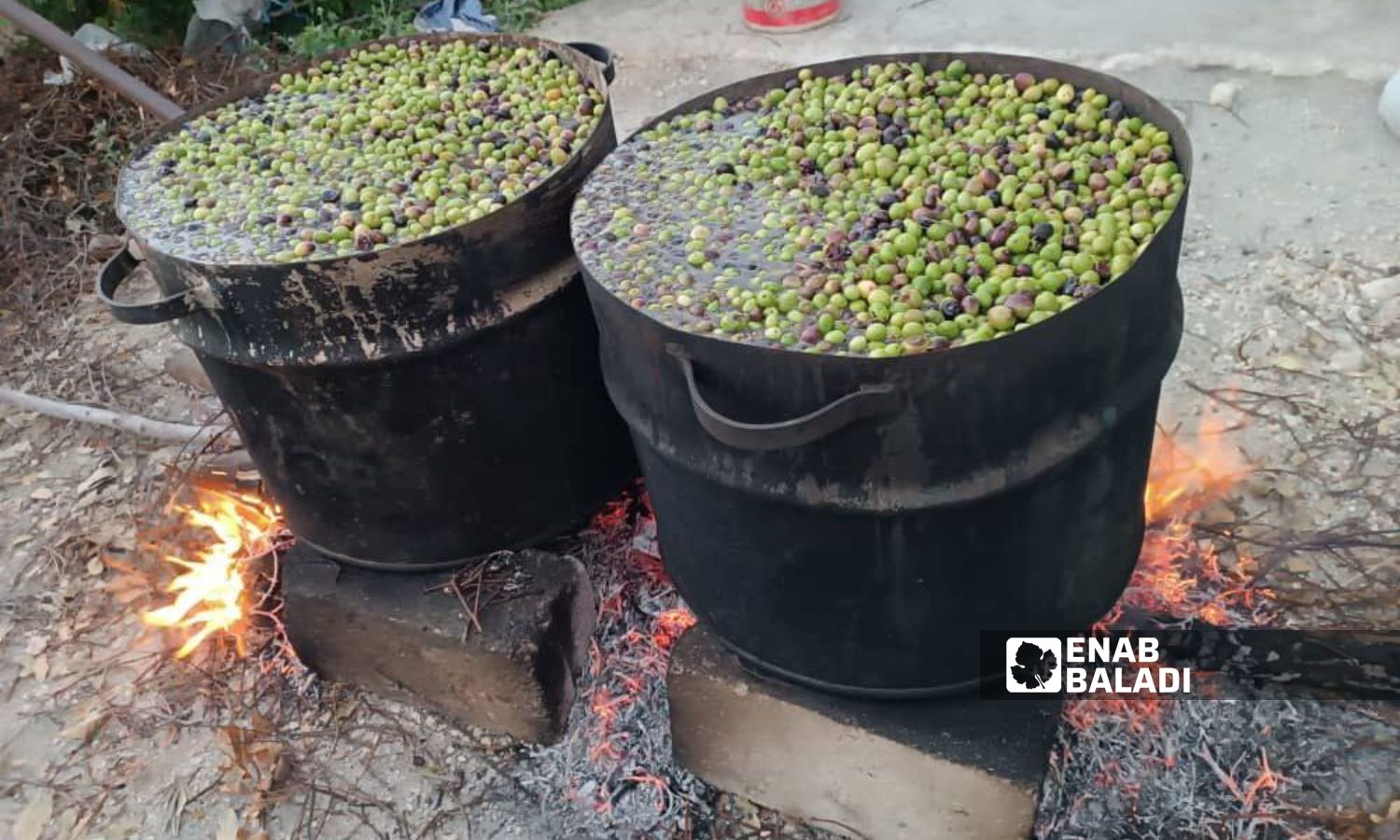



Latakia – Linda Ali
Before the date set by the Agricultural Directorates, which is September 20th, the olive harvest season began in most villages of Jableh and Baniyas for several reasons. The first is fear of the crop being stolen from the trees, and the second is that most villagers depend on boiling the olives and then pressing them to obtain “Khraij” oil.
In villages like Jiboul, Boudi, Daliah, al-Msherfeh, and Beit Yashout, villagers were about to finish harvesting, had it not been for the rain, which delayed the process for several days until the ground dries a bit.
Initial estimates for olive production in Latakia reach 50,559 tons, while the area planted with olives is 48,594 hectares, and the total number of trees reaches 10.6 million, including 9.8 million fruitful trees, according to Latakia’s Agriculture Director, Basim Douba.
Farmer Mahmoud, aged 65, in one of Jableh’s villages, needed two workers to help him and his family harvest the olive season for five days before they stopped due to rain.
He said the labor wages this year have posed a major obstacle, as production is low compared to the alternate bearing phenomenon (it was supposed to be a good production year), and a worker demands a daily wage between 100,000 and 150,000 Syrian pounds (10 dollars) for a workday that starts at 7 a.m. and continues until almost sunset.
He added that he needs six more days to finish the harvest, which will cost him about 1.5 million Syrian pounds in picking wages alone, pending the pressing process, which he said it is still unclear how much it will cost, given the current diesel shortage, and that the oil presses rely on purchasing it from the black market at a high price, as told by the owner of one of the presses, without giving him an approximate cost.
The olive work doesn’t end with the harvest. A new stage begins; the fruits are boiled over a fire, then left to dry under the sun. Afterward, the fruits are gathered and are well-covered in a process called fermentation, which takes about three to five days.
After this, they are taken to the mills to obtain “Khraij” oil, which is sold at a higher price than regular cold-pressed oil. The price of a jerrycan (tin) is between 1.8 million and 2 million Syrian pounds.
Despite being produced in abundance in the Syrian coast and considered a genuine traditional heritage, the Olive Department manager at the Ministry of Agriculture, Abeer Jawhar, previously stated it is not suitable for human consumption, as it contains high acidity levels.
With the start of production, the price of a 16-liter olive oil jerrycan has decreased from 1.5 million to between 1 million and 1.2 million Syrian pounds, and it is not expected to decrease further as production is not as expected.
The 2023 production was not good due to the alternate bearing phenomenon (a year of good yield followed by a poor one), but this year’s production is not sufficient to increase supply, especially with export opportunities increasing traders’ greed. They buy in large quantities during pressing and sell in the summer when prices rise.
Therefore, most who do not own olive fields will be unable to purchase their full provisions and instead buy by the liter as needed, like the case of Duraid, 48, a public sector employee who used to buy two to three jerrycans annually as food stocks.
Duraid stopped this habit last year and now buys it by the liter at 110,000 pounds and mixes it with two liters of sunflower vegetable oil at 23,000 pounds per liter to increase the quantity.
As for pickled olives, which are a staple in breakfast, the price per kilogram has risen between 12,000 and 16,000 pounds, depending on the size and type of olive. The best olives for pickling are called “Khodairi,” and if the olive is large, the price per kilogram might reach up to about 18,000 pounds.
if you think the article contain wrong information or you have additional details Send Correction